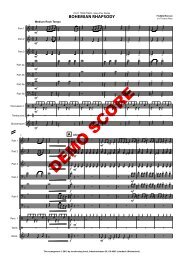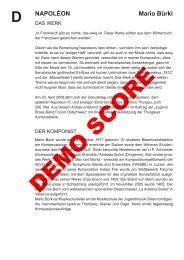Hannibal WB - Musikverlag Frank
Hannibal WB - Musikverlag Frank
Hannibal WB - Musikverlag Frank
- No tags were found...
You also want an ePaper? Increase the reach of your titles
YUMPU automatically turns print PDFs into web optimized ePapers that Google loves.
EHANNIBALMario BürkiDEMO SCORETHE COMPOSITION<strong>Hannibal</strong>, the son of Hamilcar Barca, was born in 248 BC. His father commanded the Carthaginian land forces during thelater stages of the First Punic War. He kept his army intact and led a successful guerrilla war against the Romans in Sicily.As soon as he was old enough, <strong>Hannibal</strong> joined his father›s army in the invasion of Hispania. Hamilcar Barca died in battlein 228 BC. <strong>Hannibal</strong>›s brother-in-law Hasdrubal the Fair succeeded to his command of the army with <strong>Hannibal</strong> serving asan officer under him.Hasdrubal signed a treaty with the Romans where Carthage promised not to expand north of the Ebro River. Hasdrubal alsoendeavored to consolidate Carthaginian power through diplomatic relationships with native tribes. This included arrangingthe marriage between <strong>Hannibal</strong> and an Iberian princess named Imilce.Hasdrubal the Fair was assassinated by a Celtic assassin in 221 BC. <strong>Hannibal</strong> was now proclaimed commander-in-chief bythe army. In 218 BC Carthage decided to hit back. Defeated at sea, the Carthaginians decided this time to attack Italy byland from their base in Hispania. <strong>Hannibal</strong> led an army made up of 30,000 Spanish infantrymen, 9,000 African cavalry and ateam of elephants. To attack Rome from Hispania meant that <strong>Hannibal</strong> had to take his soldiers and animals over the snowcoveredAlps.The Romans did not believe it was possible and were taken by surprise. However, the journey had taken its toll and by thetime <strong>Hannibal</strong> reached Italy, he only had 26,000 men left alive.The first battle between the two sides took place at Trebia. Although they had many more men, the Romans were heavilydefeated by the Carthaginians. One of the reasons for this was that the Romans had trouble coping with <strong>Hannibal</strong>›s elephants.The elephants were used at the front of the Carthaginian forces (similar to the way tanks were used in the First WorldWar). Because of the elephants› size and trumpeting, the Romans had great difficulty in persuading their horses to charge<strong>Hannibal</strong>›s forces.The Romans tried several different tactics against elephants. They were extremely difficult to kill, so the main aim wasto make them panic and run amok amongst the Carthaginians. They tried to do this by killing their driver or by stabbingthem with javelins in the soft skin under the tail. The Romans also discovered that elephants were frightened of the soundof squealing pigs. Therefore pigs were covered in tar, set alight and let loose amongst the elephants. The Carthaginiansattempted to counteract this tactic by giving wine to the elephants before battle and stabling them with pigs so that they wouldget used to the squealing.Although <strong>Hannibal</strong>›s elephants survived the Battle of Trebia, most of them died soon afterwards from the cold weather.However, the lack of elephants did not stop <strong>Hannibal</strong> inflicting a series of defeats on the Romans. The most important ofthese was at Cannae where over 50,000 Roman soldiers were killed and a further 19,000 were captured. <strong>Hannibal</strong>, on theother hand, lost less than 6,000 men.Even though they suffered these losses, the Romans refused to surrender. As <strong>Hannibal</strong> was never strong enough to attackRome itself, he failed to obtain a total victory over the enemy.The Roman Senate responded to these military reverses by ordering an attack on Carthaginian held Spain. This was asuccess, and Scipio Africanus, who organised the campaign, became a national hero. Scipio now started to plan an attackon Carthage, and <strong>Hannibal</strong> was forced to abandon the territory he controlled in Italy in order to defend his homeland.Scipio and his troops landed in Africa in 204 BC. Instead of attacking Carthage, Scipio visited King Masinissa of Numidia,whose cavalry had played such an important part in <strong>Hannibal</strong>›s victories over the Romans. In exchange for promises ofCarthaginian territory, King Masinissa agreed to join forces with Scipio.The Battle of Zama took place in 202 BC. <strong>Hannibal</strong> had 40,000 men and 80 elephants while Scipio had 25,000 Romansand 11,000 Numidians. <strong>Hannibal</strong> started the battle by ordering an elephant charge. However, the Romans had learnt bybitter experience how to deal with elephants. Instead of pigs they now used men blowing trumpets. The noise frightened theelephants and many of them turned and stampeded, trampling to death large numbers of Carthaginians. <strong>Hannibal</strong>›s troopswere scattered and they were gradually hunted down by the Numidian cavalry.The Romans were extremely harsh on the defeated Carthaginians. All but ten of their ships were destroyed, vast amounts ofmoney had to be handed over and all overseas territories had to be abandoned. Carthage also had to promise that in futureit would gain permission from Rome before forming alliances or going to war with other countries.<strong>Hannibal</strong> now decided to become a politician and he was elected as suffete, or chief magistrate. He reformed the wayCarthage was governed, stipulating that membership of the Hundred and Four be chosen by direct election rather than cooption.He also changed the term of office from life to a year with a term limit of two years.The Romans became concerned by <strong>Hannibal</strong>›s growing power and in 195 BC they demanded he retired from office. <strong>Hannibal</strong>moved to Ephesus, where he met Antiochus III of Syria and later became his military adviser.In 190 BC <strong>Hannibal</strong> was placed in command of a Seleucid fleet but was defeated in a battle off the Eurymedon River. He fledto Crete, before seeking refuge with King Prusias I of Bithynia, who was engaged in warfare with Rome›s ally, King EumenesII of Pergamon. <strong>Hannibal</strong> went on to serve the Bithynians in this war.The Romans became concerned about <strong>Hannibal</strong>›s naval victories and demanded that Prusias I hand him over. <strong>Hannibal</strong> wasdetermined not to fall into his enemies› hands and at Libyssa he took poison.THE COMPOSERBorn the 26 October 1977, Mario Bürki studied wind orchestral conducting at the Berne conservatory. He also followedcourses in composition with Urs Peter Scheider and conducting under the direction of Toshiyuki Shimada and AndreasSpörri. His first grand scale work Scenes of Max and Moritz gained a second place in the composition contest in Lucerneorganized by the World Association for Symphonic Bands and Ensembles ( WASBE). During the Flicorno d`Oro junior contest(Italy), Indian Fire was awarded a special prize in acknowledgement of its originality. Mario Bürki is regularly commissionedto write for Wind and Brass Band. Two of his works (Cap Hoorn und 1405 : Der Brand von Bern) were premiered at the Mid-Europe Conference in Schladming and several have been chosen as set test-piece for contests. Alongside his composing heconducts various Wind Bands and teaches trumpet and theory. Mario himself plays the trumpet, the piano and the organ.© 2008 Copyright by musikverlag frank, Industriestrasse 30, CH-4542 Luterbach, SWITZERLANDwww.musikverlag-frank.ch







![Finale 2004 - [SirbaFCS.MUS] - Musikverlag Frank](https://img.yumpu.com/41008239/1/184x260/finale-2004-sirbafcsmus-musikverlag-frank.jpg?quality=85)



